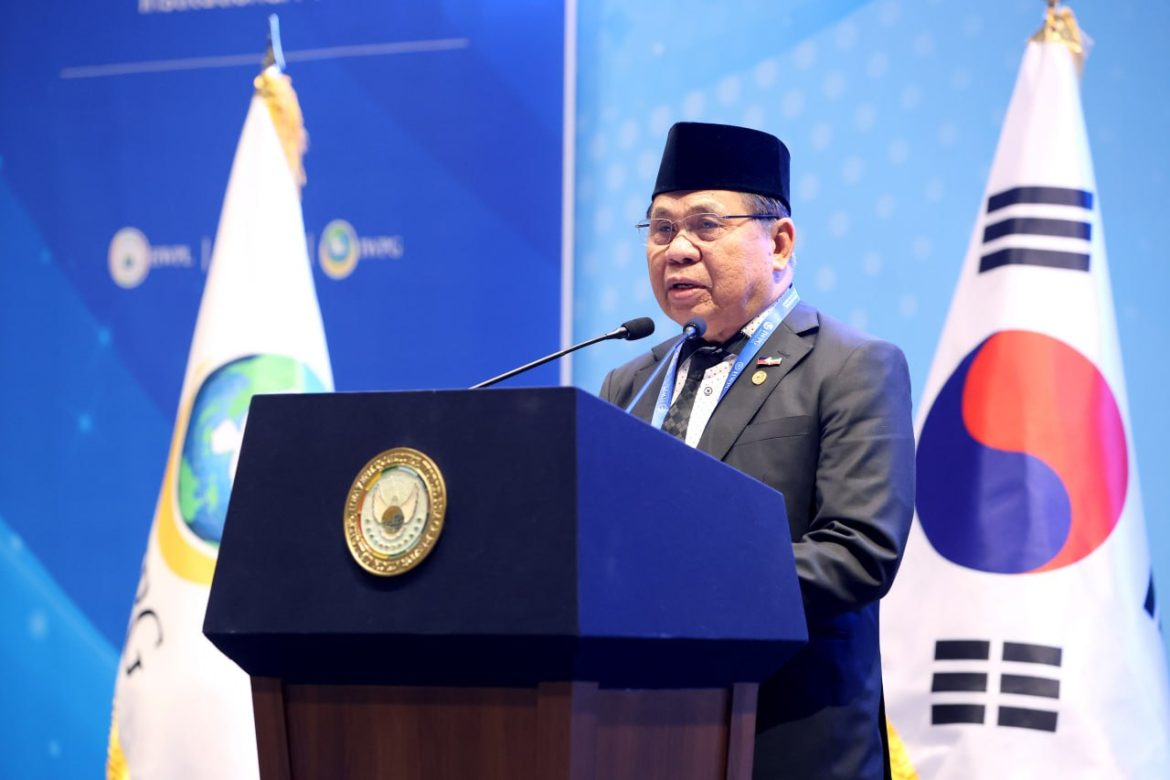Staff Reporter
Incheon, South Korea, Sept. 26 – From September 18th to 21st, more than 1,800 people hailing from 121 countries, including nations such as the United States, the Philippines, Ukraine, South Africa, Pakistan, Thailand, Romania, and India, came together to commemorate the 9th Anniversary of the September 18th HWPL World Peace Summit.
Themed “Implementing Multidimensional Strategies for Institutional Peace,” this event saw leaders and experts from diverse fields, encompassing international law, religion, education, youth, women, and media, participating in approximately 30 sessions spanning four days. These sessions facilitated in-depth discussions, not only categorized by their respective domains but also taking into account the perspectives of different countries, with the aim of devising practical and viable strategies for establishing a legally binding international law for peace.
In a poignant moment during the press conference on the 18th, Lee Man-hee, Chairman of the host organization, Heavenly Culture, World Peace, Restoration of Light (HWPL), made a heartfelt plea to politicians and leaders of nations to unite in their pursuit of peace. Drawing from his own experiences as a war veteran, having witnessed the devastating consequences of war, Lee Man-hee questioned the sacrifice of young lives in conflicts. He emphasized the importance of action, declaring, “Peace cannot be achieved through words alone. If we don’t have one, we have to create one, so we have travelled 32 times around the world to carry out peace activities. If peace had won in this world, there would have been no regrettable deaths. Through the enactment of international law, we must leave peace as a legacy to the global community where our descendants will live.”
On the inaugural day’s main session, H.E. Prof. Dr. Emil Constantinescu, the 3rd President of Romania, underscored the significance of peace by stating, “During the Summit, we agreed that Peace is not an abstract concept, but rather a supreme value of humanity that can generate a calm environment in which people can live without the threat of violent conflict or psychological pressure. We agreed to work towards the implementation of concrete measures, both in the short and above all in the long term, in order to fashion a new system of reference that replaces attitudes of ‘man against man’ with ‘man alongside man,’ expressed in the motto we adopted in 2014, ‘We Are One’.”
HWPL’s primary advocacy is the establishment of a fair and sustainable peace founded upon the Declaration of Peace and Cessation of War (DPCW), which outlines comprehensive measures for a peace continuum, ranging from conflict prevention to peace maintenance. Additionally, HWPL actively engages in interreligious dialogue, empowers youth and women to lead peace initiatives, provides peace education, and promotes a culture of peace through extensive media outreach.
During the progress report presentation, Kang Tae-ho, Managing Director of HWPL, highlighted the progress of the DPCW, which has garnered approximately 900,000 endorsements from civil society across 176 countries, including the Central American Parliament. The case of Mindanao was also showcased as an exemplar of a private-level peace agreement.
Hon. Ahod B. Ebrahim, Al haj, Chief Minister of the Bangsamoro Autonomous Region in Muslim Mindanao (BARMM) from the Philippines, expressed optimism about the transformative power of peace, saying, “Today, I stand before all of you with utmost humility and say that the Bangsamoro is now a land of peace, prosperity, and justice where Muslims, Christians, Indigenous Peoples’, and our Lumad brothers and sisters co-exist and live in harmony. As we embrace a new age in the name of peace and development, I call upon every influential leader, policymaker, and peace advocate in parts of the world to become a catapult that promotes peace, disarmament, and a sustainable future. Let us continue to write a story of peace.”
HWPL’s initiatives also encompass the Religious Peace Academy (RPA), a platform for comparative scriptural studies, operating in 130 countries worldwide to prevent conflicts and foster reconciliation through interreligious dialogue. Moreover, HWPL Peace Education, aimed at cultivating and practising peaceful values, has been implemented in numerous schools and educational institutions across 90 countries.
The officials of HWPL expressed their gratitude for the visit to South Korea by global peace messengers, including former heads of state and leaders of ministerial rank, all united by a shared aspiration for global peace. They also called for the collaboration of the South Korean government, along with the support of the international community, to ensure that such nongovernmental diplomacy contributes to the realization of achievable and lasting peace.
As a culmination of this extraordinary event, the HWPL Peace Award was presented to 13 individuals in recognition of their unwavering commitment to cooperating with HWPL’s peace initiatives. Among the esteemed recipients were H.E. Prof. Dr. Emil Constantinescu, the 3rd President of Romania; H.E. Mr. Oumar Keita, Former Permanent Delegate of Mali to UNESCO HQ; and Dr. Ciaran Burke, Professor of International Law at Friedrich Schiller University Jena in Germany.



